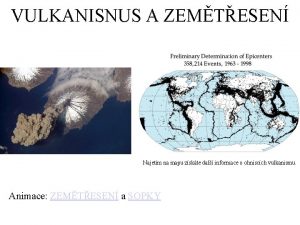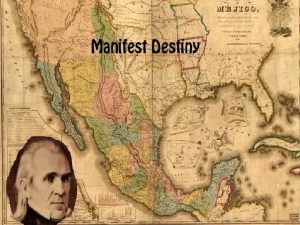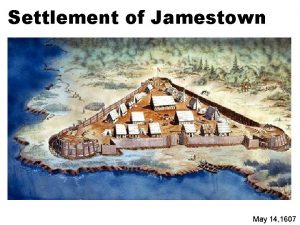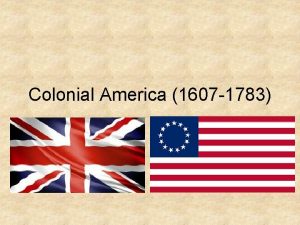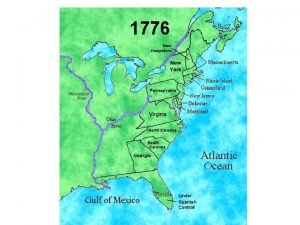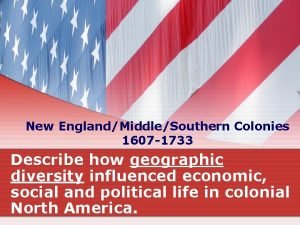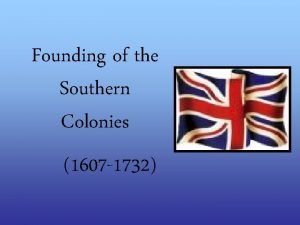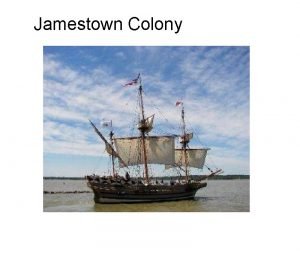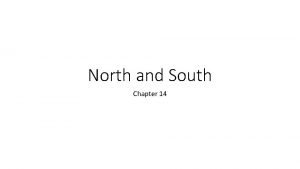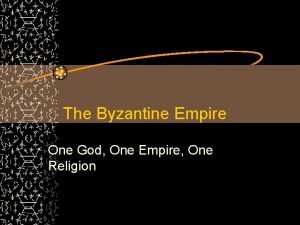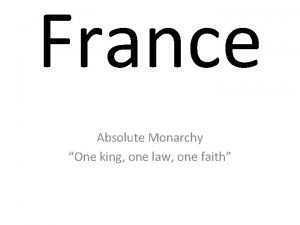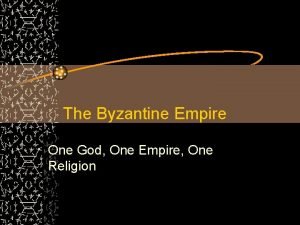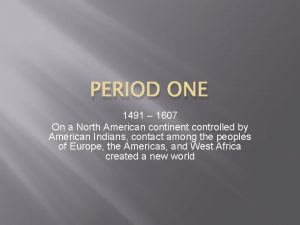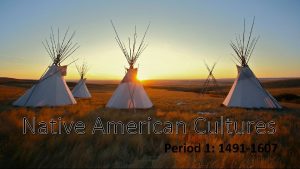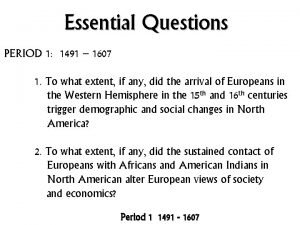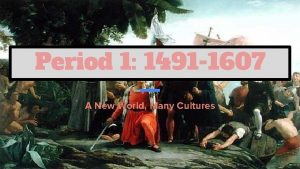PERIOD ONE 1491 1607 On a North American






























- Slides: 30

PERIOD ONE 1491 – 1607 On a North American continent controlled by American Indians, contact among the peoples of Europe, the Americas, and West Africa created a new world

KC 1. 3 Contacts among American Indians, Africans, and Europeans challenged the worldviews of each group.

Altered Views � Expansion into New World + contact with NAs & Africans new views of nonwhite peoples � Social, political, economic relationships � Role of whites in relation to nonwhites

Euro. Claims in America � Needs of Nation-states? � � $$ & support of Church (justification to rule) Power of monarchy search for riches, spread Xnty

Spain � � Height of power for F&I, unified Xn Spain GLORY for CC! � Little � gold, little spices, no path to Asia Vs. Portugal: overlap in Americas disputes Pope ruling in 1493 (line of demarcation & T of T in ‘ 94)

� Domination of of Americas by Spain � Conquistadors supremacy � Gold, silver � Encomienda System High death W. African slaves � Florida � St. � Augustine (1565) New Mexico � Santa Fe (1610) � Pueblo revolt after attempt to Xnize, Spanish out in 1692 � Texas � 1700 s � growth as resistance to French in MS RV CA � San Diego, 1769 & San Francisco, 1776, missions established, 1784

� Treatment of natives � DISEASE � Forced � � labor Few families from Spain intermarriage class system De Las Casas, 1542 � Valladolid Debate = de Las Casas vs. Sepulveda

Spanish POV on NAs JUAN DE SEPULVEDA BARTOLOME DE LAS CASAS

England � � John Cabot- 1497, Newfoundland No follow-up � Distractions- � break w/ RCC by KHVIII QE I challenged Spanish shipping, 1570 s-80 s � Drake � Raleigh (1587)

� Treatment of Natives � Settlements not near large NA empires � Families to New World � Initial coexistence, trade conflict, war NA = savages English seen as changing life of NA (increase in population loss of land, tribes scattered NAs expelled, not subjugated

France � 1530 s-40 s � Claims based on Jacques Cartier (St. Lawrence R. ) � No follow-up � European � wars, religious conflicts (RCC vs. Huguenots Treatment of Natives � NAs = economic/military allies Trade & aid in war (Huron + Fr. Vs. Iroquois) � Good relationship w/ tribes � Few colonists, towns, farms = less threat to NA � Desire control of fur trade trading posts St. Lawrence RV, Great Lakes, MS River

The Netherlands � � 1600 s- voyages out for exploration Henry Hudson up river (NY) to claim area for Dutch, 1609 formation of New Amsterdam Dutch West India Co.

Cultivation of Racism � � NAs = inferior, exploited for economic gain, converted to Xnty, military allies Little experience dealing with people who were different lack of understanding of NAs � So…

How should NAs have been treated? How civilized are these groups compared to Eur. Standards?

White Superiority � Why did it develop? � Justification � What of slavery else? Explain how conceptions of group identity emerged out of cultural interactions between colonizing groups, Africans, and American Indians in the colonial era.

Africans � Religion important in society � N. Africa, coast/ports- Islam � S of Sahara- isolated societies, � animism, polytheist W. Africa = Kingdoms based on trade, AG (sorghum, millet), copper, iron � Kings (divine), some monotheism Many polytheist, ancestor worship, celebration of virility/fertility � Empires: Ghana, � GOLD = power � Mali, Songhai Further SW- kingdoms based on trade, rich in resources, AG (yams), much fighting between “ministates”

� Trade based on gold, salt, copper, slaves , ivory � Difficult � for smaller states to trade ($$) Mid-1450 s coastal trade w/ Euros � Many states, languages, goods along coast � Grain, Ivory, Gold, Slave Coasts � Trading Posts on coast, islands � Disease inland � Experiments w/ crops, livestock on islands

Slave Trade Beginnings � Slavery widespread in Africa � Coerced labor common in societies around world � Africans- enslaved b/c of debt, sold by family for food, war captives � Sold as: AG laborers, concubines, military recruits � Euros more interested in commodities until realize value of human trafficking. � diaspora of African peoples


Slavery � � � Robin Blackburn: The “dark side of progress” Contradiction faced � Old World order of unfree labor dying � Those opposed settle in New World � development of unfree labor on massive scale � resolved issue by “racialization” of slavery

British Slavery � Slavery expanded � Profits from slavery increased industrialization ($$, capitalism) � Colonial development increased industrialization � AG (small farms large, capitalistic farms) Creates “landless workers” Can emigrate to New World labor force (3, 5, 7 yrs) � Difficult work, seen as property � Harsh conditions, low life expectancy � Value based on crop production during span of servitude

An Economic Cause � Problems? � Demand for exports increased demand for laborers increased � IS from GB voluntary, low numbers crossing = demand not met Stories from across Atlantic � shift to Africans = secure supply of labor

� Eric Williams (1943) � Slavery not racial, but economic (cheapness) � Racism a consequence/effect of slavery � Problem? � Fear of revolt � Heightened by idea of whites + blacks = joint action Ex: 1676 Bacon’s Rebellion Slaves + servants + freeman laws of racial segregation solidarity among whites idea of “privileged class” � Poor whites still have rights (GB citizens)

� � � Fear of labor resistance/rebellion white fear of black rebellion New identity develops based on racial structures slavery = black Africans GB difference from Sp/Fr/Dutch? � No blurring of racial lines (intermarriage)


NA Reaction � NA = distinct, independent �= � � � no unified response Euro goods (iron, copper, guns) interaction w/ NAs Violence, disease causes NA to find new way of life Experience of Euro. wars on continent tribal alliances w/ Euro. For support in survival � Some migrate west

Attempt at Autonomy � NAs & Africans try to maintain culture, core beliefs, political independence � Challenge by Euro.

� Euro. try to change NA beliefs, worldviews � Religion � Gender roles � Family � Role of natural environment � Ownership � NA resistance, conflict

Spanish Mission System � Florida- Apalachee � Matriarchal vs. primogeniture � H-G + AG (Three sisters) � Nature gods � Mission San Luis � Spanish conquest Rule by Country & Church � Missionaries taught Xnty, Euro. farming, loyalty to King � Collect wealth (food for people/soldiers)

African Adaptations � � Language, culture adapt to W. Hemisphere Some preservation, autonomy � Oral tradition � Group worship � Ex: Xnty + African religions � Some reject Xnty- religion of slaverholders � Others hold on to promises of freedom in New Testament, Moses from Old Testament � Music, Song � Food � Sweet potato (yams), rice, okra, sorghum, black-eyed peas, peanuts
 1491 to 1607 timeline
1491 to 1607 timeline Sopka na islandu s nadmořskou výškou 1491 m.n.m
Sopka na islandu s nadmořskou výškou 1491 m.n.m Expansion of the united states of america 1607 to 1853 map
Expansion of the united states of america 1607 to 1853 map Các số la mã
Các số la mã May 14 1607
May 14 1607 1783-1607
1783-1607 1732-1607
1732-1607 1776-1607
1776-1607 Middle colonies
Middle colonies 1607-1732
1607-1732 King james 1607
King james 1607 Blood on the river jamestown
Blood on the river jamestown True north vs magnetic north
True north vs magnetic north Integrated care system north east
Integrated care system north east Chapter 14 north and south
Chapter 14 north and south The north pole ____ a latitude of 90 degrees north
The north pole ____ a latitude of 90 degrees north One god one empire one religion
One god one empire one religion One one little dog run
One one little dog run One king one law one faith
One king one law one faith One god one empire one emperor
One god one empire one emperor One ford plan
One ford plan See one do one teach one
See one do one teach one See one, do one, teach one
See one, do one, teach one Night structure
Night structure See one do one teach one
See one do one teach one Asean tourism strategic plan
Asean tourism strategic plan Graphic organizer with the aims of la liga filipina
Graphic organizer with the aims of la liga filipina The development of children 7th edition
The development of children 7th edition A&p flix activity: generation of an action potential
A&p flix activity: generation of an action potential Is hyperpolarization the same as refractory period
Is hyperpolarization the same as refractory period Critical period vs sensitive period
Critical period vs sensitive period

